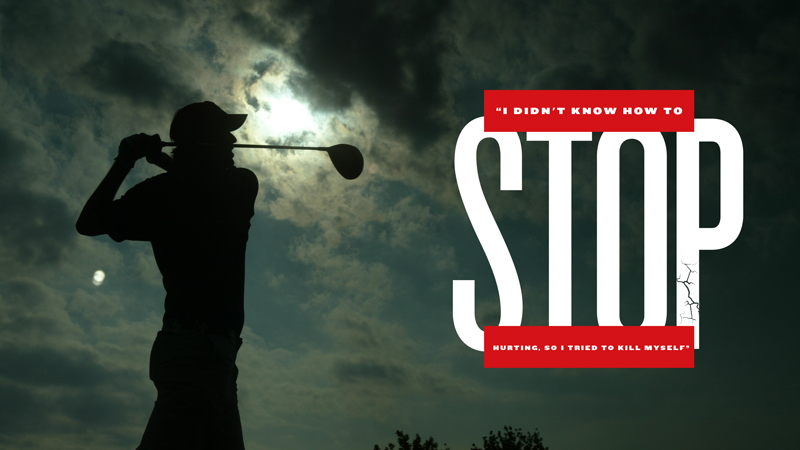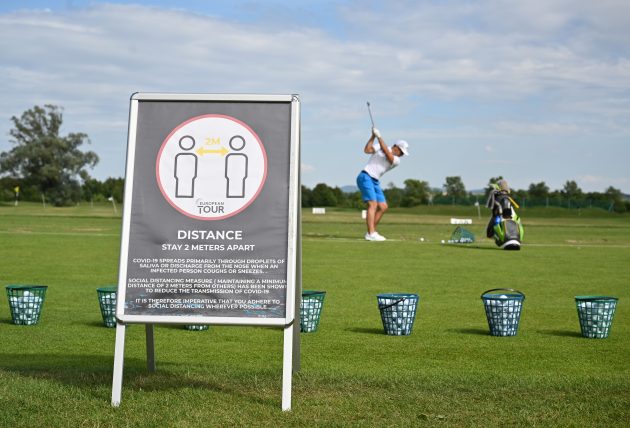Mental Health In Golf - “No One Wants To Die. We Just Don’t Want To Hurt"
Alan Dymock investigates the mental health pressures associated with professional golf and the unique challenges players can face

Subscribe to the Golf Monthly newsletter to stay up to date with all the latest tour news, equipment news, reviews, head-to-heads and buyer’s guides from our team of experienced experts.
You are now subscribed
Your newsletter sign-up was successful
Want to add more newsletters?

Delivered daily
Daily Newsletter
Sign up for all the latest tour news, gear reviews, head-to-heads and buyer’s guides plus features, tips from our top 50 coaches and rules advice from our expert team.

Once a week
Kick Point
Sign up to our free Kick Point newsletter, filled with the latest gear reviews and expert advice as well as the best deals we spot each week.

Once a week
Women's Golf Edit
Sign up to our free newsletter, filled with news, features, tips and best buys surrounding the world of women’s golf. If you’re a female golfer, you won’t want to miss out!
Alan Dymock investigates the mental health pressures associated with professional golf and the unique challenges players can face
Mental Health In Golf - “No One Wants To Die. We Just Don’t Want To Hurt"
It’s the quicksand,” says former Canadian Tour golfer Andrew Jensen, calmly guiding us through the journey to his personal low and the realisation that he has an illness.
“I mean, two or three years into my career, I’m C$20,000 in debt, and it’s like ‘okay, how do you get out of this?’ You’ve got to play well. Oh, next year, I’m in C$40,000 of debt. ‘How do you get out of this?’ You’ve got to play well.
“And then when I was sick by 2011, I was like C$45,000 in debt. I had no job. I had my parents’ basement. I had nothing to offer anybody. So all of these triggers just hurt so much and for me, I didn’t know how to stop hurting so I tried to kill myself a couple of times, because that was the only way my brain computed. Just stop hurting.
“No one wants to die. We just don’t want to hurt, right. That’s the human make-up.”
It’s a matter-of-fact way of rendering a sickening decision, but there is also a history leading into this.
Subscribe to the Golf Monthly newsletter to stay up to date with all the latest tour news, equipment news, reviews, head-to-heads and buyer’s guides from our team of experienced experts.
He goes on: “I tried to kill myself in the year 2000 [as a teenager]. I stood on roadways after missing cuts and tournaments, thinking ‘just let a car hit me.’ All these things have happened and then 2011 is when it was like, ‘Okay, you’ve got to go to the doctor man.’”
Jensen tried to throw himself off a roof that year and ended up hospitalised.
Just a few weeks earlier in 2011, he had been on what he now believes was the wrong medication for him, medication he also tried to overdose on.
He vividly remembers moments from that year: the arresting realisation of suicidal thoughts while he was in the shower; screaming at himself in the mirror with a stomach full of gin and pills; the aftermath of the aborted jump.
He also remembers the time in 2008 – his first fully-exempt year on the Canadian Tour having come through Q-School – when a doctor told him he might suffer from seasonal depression and he told the friendly physician to “f*** off.”
But today Jensen welcomes dialogue about it all. He’s enthusiastic about it.
From 2008 to 2011’s incidents he was touring, with a mix of exempt and semi-exempt status, and he played events for years after a 2012 comeback, but in recent times he has seen YouTubing become his full-time gig and he will speak about his experiences whenever asked.
As Jensen explains, if it was ever his fate to lead a Major and the day-three television coverage repeatedly discussed his mental health emergencies, he would be fine with that.
Surely, he deduces, it is better for discussions of mental illness to be accessible, rather than taboo. It’s a growing trend in golf.
In recent years big names like Bubba Watson, Andrew Johnston and Thomas Bjorn have opened up about their lives in top-end sport and the impact anxiety, depression, isolation or self-loathing can have on them.
However, if you are to welcome the breaking of barriers, to embrace grown-up, balanced discussions of the difficulties some golfers can face as they seek to get a handle on their mental health on the road, you cannot focus on just one or two tours or Major favourites. Or one point of view.
Because before you even talk about mental health, you must acknowledge there is a whole golfing world out there, and the pressures and pleasures faced are vastly different.
Making a living
Leon Fricker believes he has his balance right.
But what he can do is offer a perspective on what it’s like away from the headline tours. Having spent a few years on the China Tour and now on the PGA EuroPro Tour, he can give us a reality check on the lifestyle.
As he explains of the varied pressures of expectations, reaching potential, realising dreams and securing a cheque, “I’ve chosen to look at it in a different way and I’ve managed to grow off the course with my relationships and get a little bit more support going into 2021, which is huge for my mental health as well. Because it’s not nice when you are grinding for every penny to play the next week.”
In ‘tier three’, Fricker says, string a few big tournaments together or get a win and you can earn your place at a bigger tournament. Your life can change pretty fast.
But there’s a stress that comes with pursuing that. And if you look at a yearly schedule, you can target the big events you have to be at, but there are holes to fill and at a cost.
The bills for accommodation, travel, tournament entry, caddie fees, food and any other services stack up. That’s another stress.

Looking back on his arrival on the China Tour in 2018, nursing an injury but happy to have earned his place, Fricker says: “I wasn’t playing good golf. That was the lowest I’ve ever felt. I was travelling around this beautiful country and I was just lost, spending like a grand a week and then missing every cut for six weeks in a row.”
At this point Fricker learned that six bad weeks does not mean a career is dead.
He is also grateful for a sensational support network, with father Martin, a performance coach, offering succour. But a support network may not be available to everyone, especially on the road.
James Lambdon is an applied sport psychologist at the University of Bath, working with collegiate sportspeople right through to Olympic athletes on campus.
He has also worked across golf and founded the psychology consultancy company, Think Clearly Golf.
“The main difference I’ve noticed in working with players who have moved through the different tour levels is that it’s not as easy to separate the management role you’ve got to play in your own performance, and being the performer,” Lambdon says.
“They probably have to pick and choose their own flights, book loads, ask for refunds… There’s a lot of organisational elements that the individual golfer has to look after, which, in a team setting, a manager or maybe a coach or some of the logistical support staff will take care of.
“Golf will be quite an attractive job to have, looking from the outside in. I don’t think people fully anticipate that most of the time, unless you’re on the top tours, you’re going to be operating at a loss. Every decision you’re making has got pound or dollar signs associated with it.
"And there isn’t enough time to see things through, even if you know it’s the right way. There’s almost a culture of searching for quick wins, because you need to make ends meet week to week in order to get to certain competitions.
“There’s obviously pressure associated with the outcomes of being on the tour, and the irony is the better you do, the better the invites get. Which means that you’re then opening yourself up to more potential earnings.
"So inherently, everything is telling you to focus on results, even if you know you shouldn’t. And even if people around you are telling you not to, the implicit pressure, I suppose, is that everything’s result-focused.”
You can almost feel a weight building with those words, but Lambdon points out that everything in life is about moderation.
We all probably know characters whose love of winning is not only a healthy driver, but a necessary one (more on that later). The key, Lambdon adds, is that it does not become an all-consuming purpose.
Several interviewees for this piece touch on the visible pathway open to many golfers – the college scholarships, the qualifiers, the sponsors push and the cuts at big tournaments.
So when we see young talents fade away, it feels dispassionate, but is it okay to say that elite golf isn’t suited to everyone?
“It’s not a lifestyle you have a lot of say in either,” Lambdon comes back with, detailing the repetitious and rigid pattern of tournament weeks.

“That’s quite a controlling structure, which means that you’ve then got to find a way to adapt to that structure every place you go, rather than necessarily being able to do as many things as you want to that are good for your mental health.”
There is more to consider: if you progress up the levels, are you suddenly confronted with the need to develop coping skills you haven’t done previously, as the field gets stronger?
And if someone is on an upwards trajectory, quickly, and has the swing coach, the personal trainer, the management company and more, will they also factor in psychology or the need to analyse the state of their mental health, or will that be a case of ‘put out that fire when it arises’?
Prolonged periods of dealing with stress or anxiety without addressing it could lead to trouble further down the line for some. Which makes you wonder if there is scope to lie to yourself or dodge serious questions when you are on tour life’s conveyor belt.
“There’s potential to engage in quite a lot of avoidance behaviours around the maintenance of your mental health,” says Lambdon.
“For example, let’s say that the European Tour is about to spend three weeks on a desert swing. If I know that I’ve not had the right support around me in Abu Dhabi and it certainly impacted how I felt about myself and then ultimately affected my performance, I then move on to Dubai.
"I can think, ‘Right, now I’ve got to do something about the social support’, but you can avoid it because you’re in a new place. It’s a new start. It’s a fresh appraisal of the situation.
“By not seeking out support, I’m not putting myself out there and feeling vulnerable about it. And by deciding not to do that, that feels like a quick win. It’s easier for me to go, ‘Nah, just suck it up and get on with it,’ than it is for me to address the facts, be vulnerable and say, ‘Look, I need a bit of help here.’
“There’s this stereotypical view that all high-performance athletes are mentally strong, they’re determined, they’re motivated, they don’t show any sign of weakness, they’re relentless.
"In golf there’s a lot of focus around players being in ‘the grind’. It’s just head down, working really hard, getting through everything and making sure they’re perfecting parts of their game – which is not really that healthy.
"It perpetuates this belief that all players have to be quite robotic, not emotional, not vulnerable.”
Life on tour
If swings are as unique as fingerprints, it would be folly to assume everyone who wields a club will react the same to pressures on tour.
If you want the anecdote about the athlete rising to the occasion because of the pressure, Eddie Pepperell has two for you.
The first is when he won on the Challenge Tour, when his back was against the wall and he couldn’t even afford to pay his hotel bill for the week.
He recalled thinking, “I need that 25 grand.”
The second was in 2014, when he had a mortgage to pay but just £1,500 in his bank account and needed to turn things around.
“What I have found,” Pepperell tells Golf Monthly, “is that actually the worst thing that can happen to me is to be secure.”
Pepperell talks about the role of form, but he also believes that athletes need to accept their own predispositions and never “gloat about your psychological tendencies”.
Rather, he says, the best approach is to accept your tendencies – be honest about them – and then surround yourself with the best resources to support those.
In his own style, Pepperell adds: “I occasionally think of your mental health as a bit like a Horcrux from Harry Potter [an object used to store a fragment of a person’s soul, to protect them] – depending on your real passions, you could have a number of Horcruxes. There’s only about two or three in my life, but I think you try to manage those and then generally speaking, the whole entity takes care of itself.”
What Pepperell has no problem admitting is that touring under the shadow of Covid is a source of chagrin.
He points out there are some tourists who would stay in a hotel and have room service every night regardless of whether there is a pandemic on or not, but for him it’s been a struggle.

In an honest fashion, he also adds: “There is camaraderie [on tour], but I don’t know there’s the kind of camaraderie where people have very, very close friends on tour, so when one really, really struggles, you could be bailed out by friends, so to speak. I don’t think those relationships are very common.
“The truth is there isn’t much of a safety net at all with golf. But again, on the other side of that coin there’s a huge upside to golf. I’ve always felt that’s relatively proportionate – if you can earn a lot of money you should theoretically also be able to lose a lot of money.
“I think [golf] is still a pretty traditional and old-fashioned environment in many ways. It’s still very masculine, for example. So there’s only so much change I think you’ll see, but that doesn’t strike me as being wholly negative.”
Pepperell sees real, undeniable benefits to the golfing lifestyle, with travel and the exploration of different cultures chiefly among them.
The European Tour’s chief medic is Dr Andrew Murray, who also sees plenty of benefits to the golfing lifestyle.

Dr Murray points out that discourse around anxiety or depression or adjustment disorder in elite sport has increased in recent years.
At the same time, he says, surveys have shown that more than 60% of people found life harder in 2020 than in 2019. So it makes sense that mental health and well-being training is available to tour staff, players and caddies alike – all tour physios and player relations department members have received mental health first-aid training, he says.
Murray also explains the services available: “There’s an emergency hotline available 24/7, 365 days a year, where people can get in touch if they really are struggling and can receive immediate support and attention. That’s with our colleagues at Cognacity, who offer similar services across other professional sports.
“We also have a chief medical officer – which is myself – who’d be available 365 days a year, 24 hours a day, and certainly that has happened this year. We have had instances when players have called at three in the morning. They’ll call at a time when they’re struggling and they need support, and we’re very happy to provide that.
“And obviously, we have got a doctor on site every week on tour. Players may present with a sore wrist, they may present with hayfever, enquiries about their asthma or their knee, but about 15% of our consultations at this point in time have a component of mental health and well-being to them. Which I think shows we’re in keeping with other sports, but also that our golfers are recognising how important it is to their health and performance and are engaging with us on that.”
In the coming years, Dr Murray would like to see what more can be learned across sports, adding that fellow medics are always talking.
Being real
Do people talk about their mental health enough?
“Full stop: no,” says Christina Kim, one of the best-known characters on the LPGA Tour.
“But you can say mental health in the golf industry is not spoken about enough and I can combat that and say I don’t think mental health is spoken about enough, period, regardless of what someone’s background is, what their occupation is, anything like that. We’ve grown up in this society [talking about] being strong and people don’t necessarily even understand what the word ‘strength’ may mean.”
Are we talking about perception here? Kim goes on: “One of my personal issues over the years, within the game and how it’s represented to the public, is golf coverage. One of the best things to come out in the golf world is the concept of PGA Tour Live, where you can follow specific groups, see every single shot and realise they don’t hit every shot 340 yards down the middle and they don’t hit every single shot to five feet.
"You see some shots the best in the world hit and you’re like ‘that is garbage!’ But they are still able to come around and recover from that.”
It’s a point Lambdon touches on from another perspective: if you are not playing well, you can be anxious enough and then you clock that the TV cameras aren’t around you.
But Kim points back to the act of social editing that parallels with selective coverage, with many golfers putting up an airbrushed image of their life.
She adds: “I was always bubbly and smiling and this and that, and I thought that I was being strong, but I wasn’t acknowledging what was really going on underneath the surface.
"For me, the realisation of where strength truly comes from is facing your fears and bearing witness to the truth, and sometimes the truth is not pretty. Sometimes the truth can be scary.”
Kim credits boyfriend and caddie Duncan French for saving her life in 2010, as the thought of leaving him at a party stopped her from jumping off a roof into the Mediterranean. She has openly written about her experiences with depression.
Kim tosses out a line that lands right in the middle of all of this: “You don’t show strength by denying reality.”

She also does not believe that golf, performance or perception of the sport defines who she is. Some may disagree, but she sounds pretty happy with her approach.
“When I’m out on tour there is such an important place in my world for forgiveness,” Kim says.
“For forgiveness of self. Because when I’m in a tournament, I will never try to mishit a shot, I will never try to shank a shot.
“If you want to get mad, get mad quick. Then focus on ‘Okay, I am in the woods, but there’s a small window.’ You’re saying there’s a chance – it’s all about having that endless hope, that endless faith.
"For me it has nothing to do with expectations, but about the process, the equation, the mathematics of the motions that your body puts on to the ball.
"And then there has to be a time when you let go, accept the results and focus on now. Not what was. Not what will be. Now.”
Kim will help any young player who seeks her out, but adds that while talk increases across all sport and more avenues for help open up, players who need help must firstly stop deflecting and recognise there is something wrong. It’s time to talk.
If you don’t know where to turn, try:
- mind.org.uk/information-support/tips-for-everyday-living/mentalhealth.org.uk/getting-help
- Campaign Against Living Miserably (CALM) - 0800 58 58 58; thecalmzone.net
- Samaritans - call 116 123 (open 24/7)
- Text SHOUT to 85258 - confidential 24/7 text service offering support if you are in a crisis and need immediate help